Tome 101
How to Craft a Strong AI Prompt

Generative AI is definitely here. You've likely encountered countless LinkedIn posts, sat through numerous meetings, and even witnessed debates online, all focused on AI’s potential power and effectiveness. While some say AI is a transformative tool streamlining processes and enhancing efficiency, others remain skeptical about its ability to deliver desired outcomes.
In the midst of this ongoing debate, Tome has identified a crucial factor that determines AI's effectiveness: the art of crafting the perfect prompt. Whether you're aiming to generate captivating narratives or precise data analyses, the way you frame your prompts significantly influences AI's response. Every detail of your AI prompt matters, from choosing the right language to providing clear specifications.
Below, we’ll break down the elements of a compelling AI prompt structure, share actionable tips on prompt writing, and show a few examples to get you on your way.
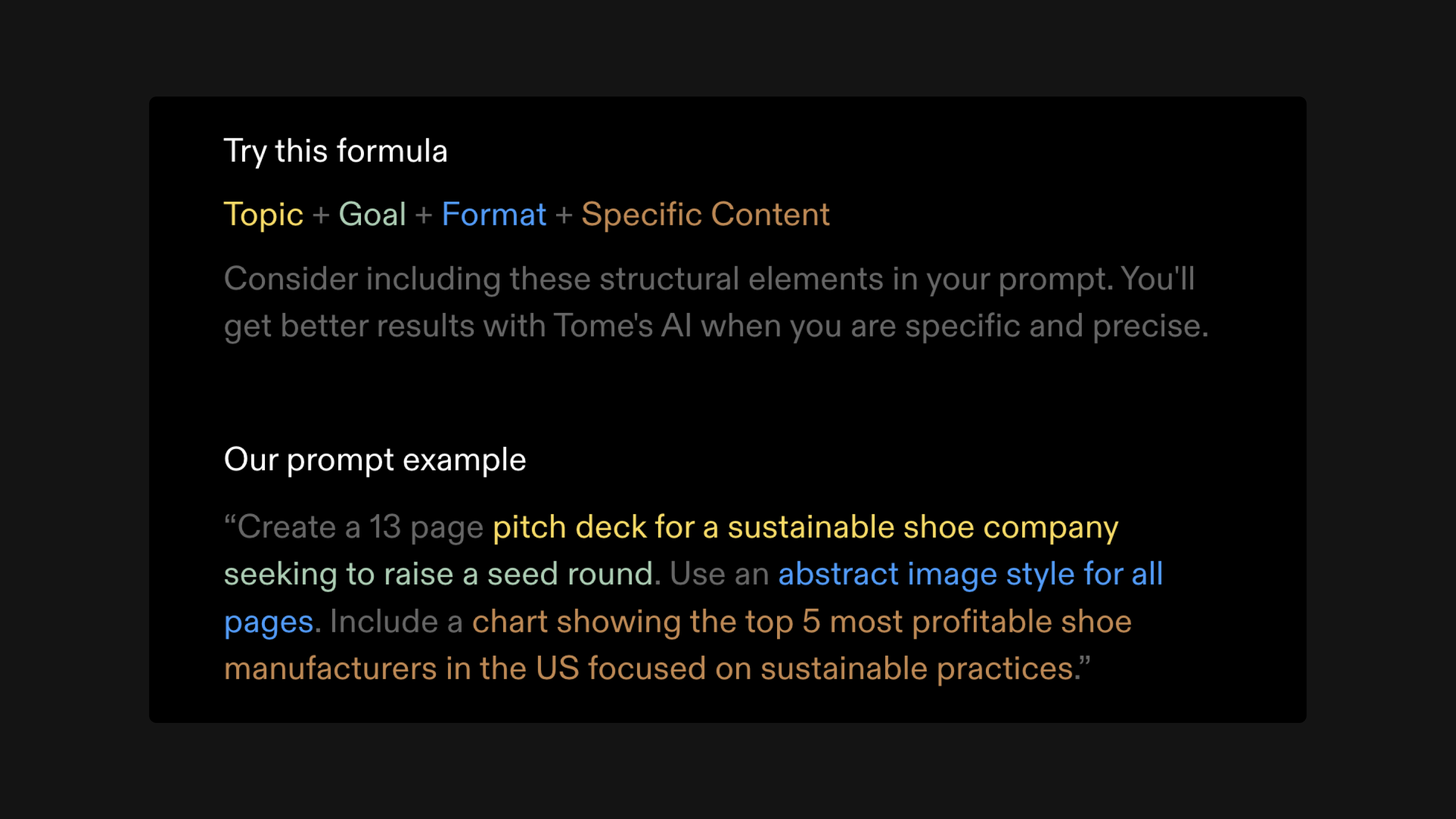
What are good AI prompts?
Think of a good AI prompt as a simple formula with expressions. In the prompt example above, the expressions comprise key elements that should be top of mind as you sit down to ask AI for help making work.
This is a flexible formula and can be rearranged as needed but in general, a good ai prompt will include a solid topic, a clear goal, a specific format, and descriptive content. With this formula in hand, or different variations of it, your desiredAI platform is more likely to generate your ideal output.
Elements to include in your AI prompt
Here are five strategic tips for crafting strong AI prompts.
1. Be direct
Learning how to communicate with LLMs (large learning models) is similar to asking a favor of a friend or teammate. It's best to be straightforward in your language, be clear and get to the point. Avoid jargon, overly complex vocabulary or convoluted phrasing.
Check out the prompt example below and the tome.
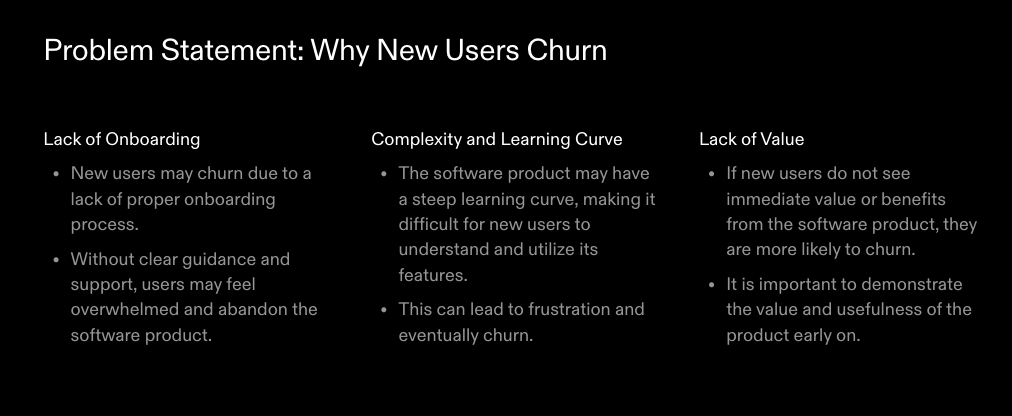
💡AI Prompt Tips💡
- If you have a long list of points you want to talk about in your presentation, write them all down.
- Include a page count at the end of your prompt, i.e., “make it # pages long”
- Tome’s AI organizes all points into an outline. Manually refine and reorder points from there.
2. Be specific
Get as prescriptive and specific as you can. Context is key so fill in as many details that you think is necessary to make your points. The more context the LLM has in your prompt, the better output you'll get.
Be detailed but at a high-level, think of a prompt as a simple storytelling framework. Every good story has a clear beginning, a middle and an end, just be sure to be clear.
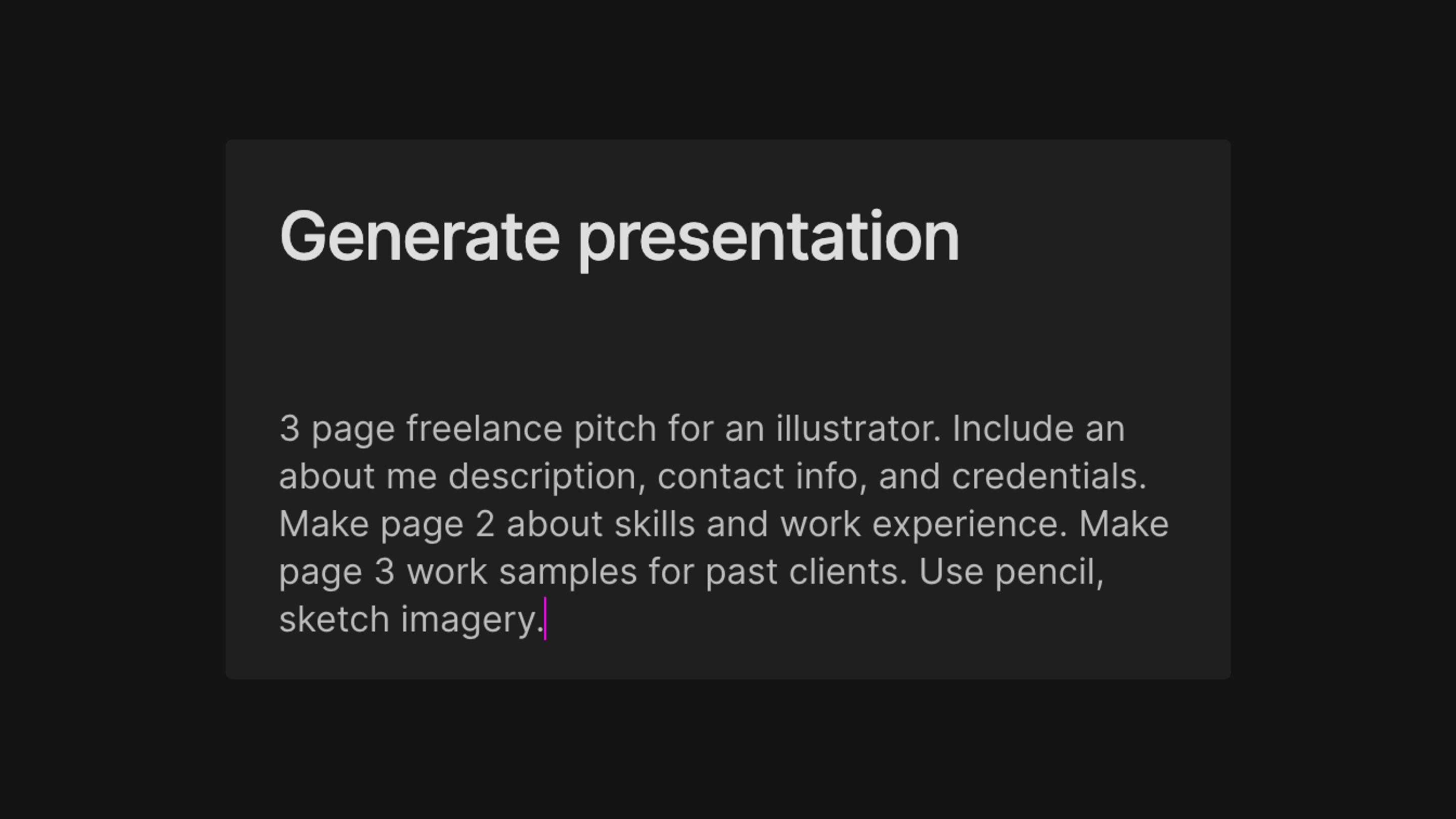
💡AI Prompt Tips💡
- Ask AI to follow a specific outline by literally asking for it word for word, i.e., “Write out each page’s title and content.”
- Format with specificity, i.e., “Use bullets only for text,” or “Text should be in bullets.”
- Err away from negatives, i.e., avoid using don't. Telling Tome's AI what not to do can often lead to inaccurate outputs.
3. Be creative
You're here because you likely are already aware of the limitless creative potential that AI brings to the table. You can include requests in your prompts denoting data and diagrams, or the type of AI imagery you'd like in your presentation.
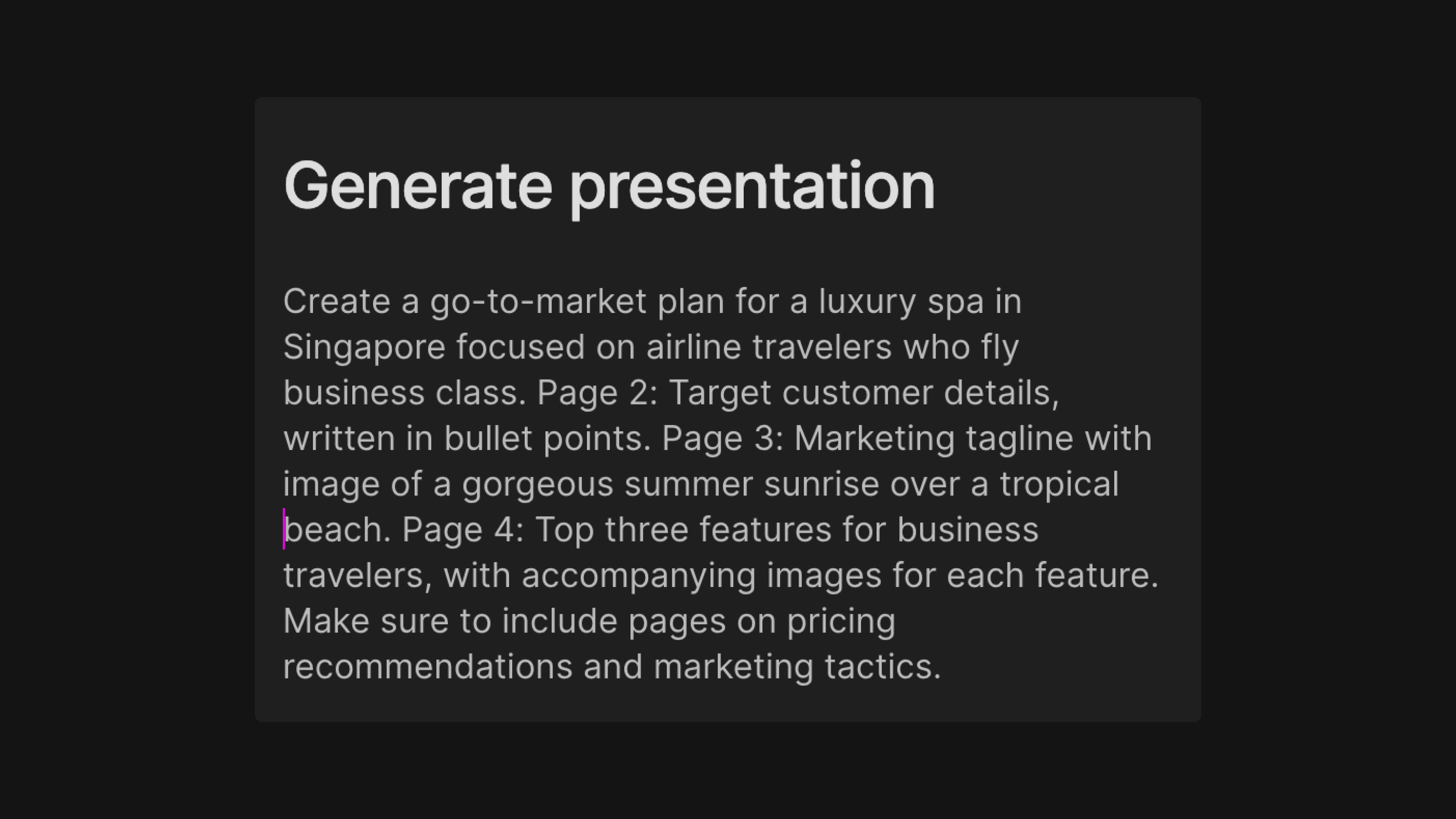
💡AI Prompt Tips💡
- Ask for “a flowchart” in your Create a presentation about instructions to make an editable diagram with AI automatically.
- Specify the image style you want in your prompt. Aask for “colorful, abstract images,” “pencil sketches,” “photorealistic images.”
- By default, AI-generated images are now less cartoonish and more consistent in their visual style across all pages.
4. Be mindful of tone and voice.
Highlight the benefit of defining what you want your tone and voice to be in your AI prompt. For example, if you’re creating a professional, business-oriented piece of content and need writing to match, simply include that within your prompt. Same for a personal document such as a party invitation where you’re looking to express information in a conversational, friendly tone.
5. Be constructive
Highlight the benefit of giving feedback to your AI and how that can help tweak outcomes to be what you’re looking for.
Prompt writing is more art than science although this is quickly evolving on a daily basis. Be open to experimenting with your AI prompts. You might not get the perfect result the first time—ideating is just part of the prompt process.
We can't wait to see where your prompts take you. Stay tuned for more in the Tome 101 series on our Blog.
What would you like to do more of with Tome? Let us know at team@tome.page.
You may also like...
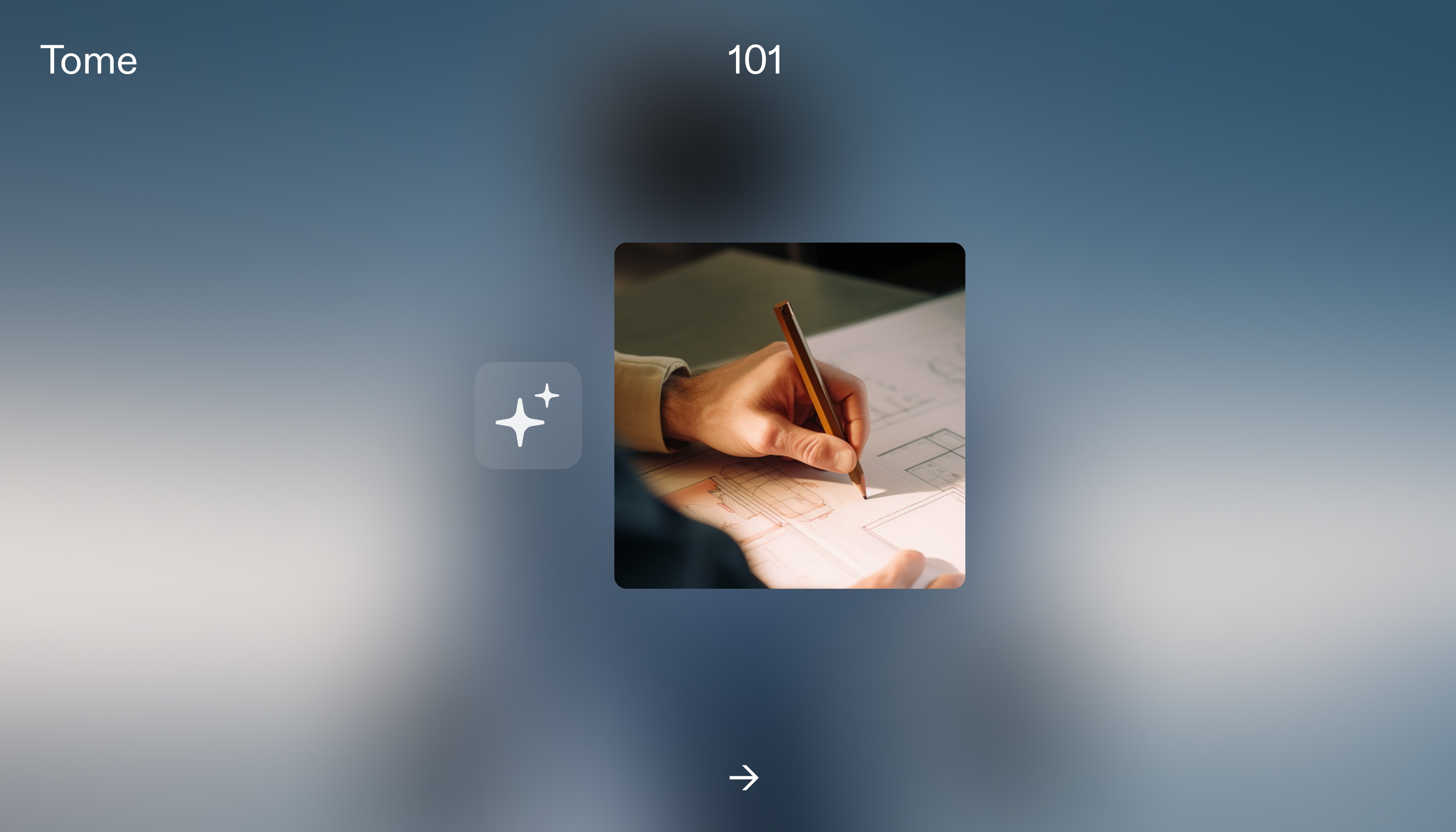
Learn how to use Tome's AI to generate new ideas and spark inspiration for impactful work, every time.

In the dynamic world of B2B sales, generating quality leads is crucial for business growth and sustainability. The ability to attract and convert potential clients into loyal customers can significantly impact a company's revenue and market presence. This is where advanced tools like Tome come into play. Tome, an AI-driven sales tool, is revolutionizing how businesses approach lead generation, making the process more efficient and effective. In this article, we'll delve into the importance of B2B lead generation, explore strategies to enhance lead volume, and see how Tome can be integrated into your sales strategy to yield impressive results. Why B2B Lead Generation is Important B2B lead generation is the lifeblood of any thriving business. It is the process of identifying and attracting potential customers who have a genuine interest in your product or service. For sales leaders, this process is crucial not just for driving revenue but also for ensuring a steady stream of business opportunities. Without a consistent influx of leads, a company risks stagnation and potential decline in its competitive edge. Understanding MQLs and SQLs Marketing Qualified Leads (MQLs) and Sales Qualified Leads (SQLs) are critical concepts in lead generation. MQLs are leads that have shown interest in your marketing efforts, such as downloading a whitepaper or attending a webinar. They are considered more likely to become customers compared to other leads. SQLs, on the other hand, are leads that have been vetted by the sales team and are deemed ready for direct sales engagement. For sales leaders, understanding the distinction between MQLs and SQLs is crucial for tailoring the right approach at each stage of the buyer’s journey. MQLs are nurtured through targeted marketing efforts until they exhibit behaviors that qualify them as SQLs. This transition from MQL to SQL is a critical step as it marks the lead’s readiness for a sales pitch. Lead scoring, nurturing, and qualification are integral to this process. By assigning values to leads based on their engagement levels and behaviors, and providing relevant content to build interest and trust, sales leaders can ensure that only the most promising leads are passed to the sales team. Steps to Improve Lead Generation Volume Improving lead generation volume is a strategic process that requires a multi-faceted approach. Here are the essential steps for sales leaders to enhance their lead generation efforts: Identify Your Target Audience Understand who your ideal customers are and what they need. Use demographic data, customer personas, and market research to pinpoint your audience. Focus your marketing efforts on attracting the right prospects. Leverage Content Marketing Create valuable and relevant content that addresses your audience’s pain points and interests. Develop blog posts, whitepapers, case studies, and videos. Position your company as an industry authority with high-quality content. Optimize for SEO Ensure your website and content are optimized for relevant keywords. Improve website loading times and user experience. Increase your visibility on search engines to attract organic traffic. Engage on Social Media Share your content and participate in industry discussions. Use targeted ads to reach a broader audience. Directly interact with prospects to build relationships and trust. Implement Email Marketing Build a quality email list and send personalized, relevant content to subscribers. Use automation to nurture leads through drip campaigns. Track engagement and refine your approach to ensure timely and relevant messaging. Leveraging AI in B2B Lead Generation Artificial Intelligence (AI) offers numerous benefits for B2B lead generation. For sales leaders, AI can analyze vast amounts of data quickly, identify patterns, and predict behaviors. This allows businesses to make informed decisions and tailor their marketing efforts more precisely. AI-driven tools can automate repetitive tasks, freeing up time for your sales team to focus on high-value activities. There are several AI tools available that can enhance your lead generation efforts. These tools can automate tasks, provide insights, and streamline processes. Examples include AI-driven chatbots, predictive analytics platforms, and customer relationship management (CRM) systems. These tools can help you identify high-quality leads, predict their behaviors, and automate follow-up actions, increasing the efficiency of your lead generation efforts. Tome stands out as an AI-driven sales tool designed to optimize lead generation and management. Tome uses advanced algorithms to identify high-quality leads, predict their behaviors, and automate follow-up actions. This not only saves time but also increases the efficiency of your lead generation efforts. By integrating Tome into your lead generation strategy, you can leverage its advanced features to enhance your lead generation process. Integrating Tome into Your Lead Generation Strategy With Tome, your lead generation strategy becomes smarter and more targeted thanks to advanced AI technology. By leveraging cutting-edge algorithms, Tome is able to prioritize leads based on fit and intent with remarkable accuracy. This ensures that your team spends their valuable time and resources on the prospects most likely to convert, ultimately improving your overall conversion rates. The AI technology behind Tome also goes beyond lead prioritization, guiding your outreach efforts with personalized messaging suggestions that align perfectly with each prospect’s unique needs and challenges. Through sophisticated analysis of customer data and behavior, the AI capabilities of Tome provide invaluable insights into the most effective outreach strategies, helping your team to craft compelling and relevant messages that marry your value prop to the initiatives your buyers care about. By integrating Tome, you're not just enhancing your research and lead generation processes; you're empowering your team with a powerful assistant that makes every step of the process more strategic and impactful, thanks to the advanced AI technology at its core. Measuring Lead Generation Success Measuring the success of your lead generation efforts is essential for continuous improvement. Key metrics to track include lead conversion rate, cost per lead, lead quality score, customer acquisition cost, and return on investment (ROI). By tracking these metrics, sales leaders can gain insights into the effectiveness of their lead generation strategies and identify areas for improvement. Use tools like Google Analytics, CRM systems, and AI-driven analytics platforms to track and analyze your lead generation metrics. Regularly review your data to identify trends, areas for improvement, and successful strategies. Lead generation is an ongoing process that requires continuous refinement. Use the insights gained from your metrics to make data-driven decisions and adjust your strategies. Experiment with new approaches, learn from your successes and failures, and stay updated with industry trends. Try Tome Today In the ever-evolving landscape of B2B sales, effective lead generation is paramount for business success. By understanding the importance of lead generation, leveraging AI tools like Tome, and continuously optimizing your strategies, you can unlock the full potential of your sales efforts. Tome’s advanced features and capabilities make it an invaluable asset for any business looking to enhance their lead generation process. Embrace the power of AI, and watch your business grow.